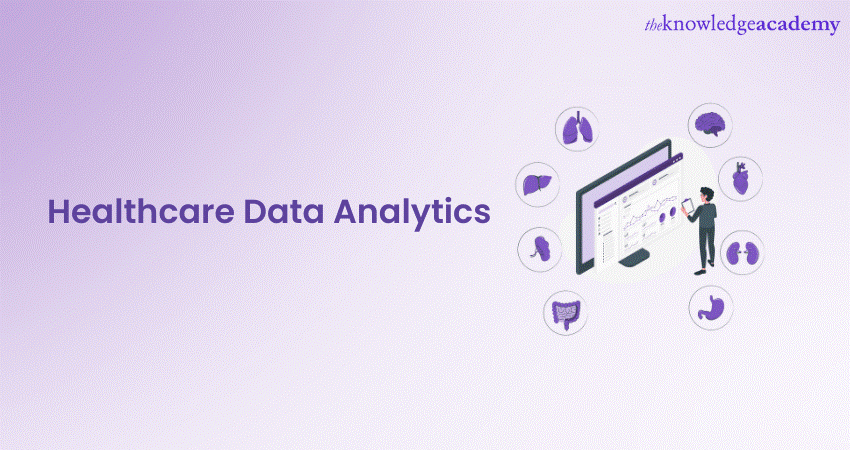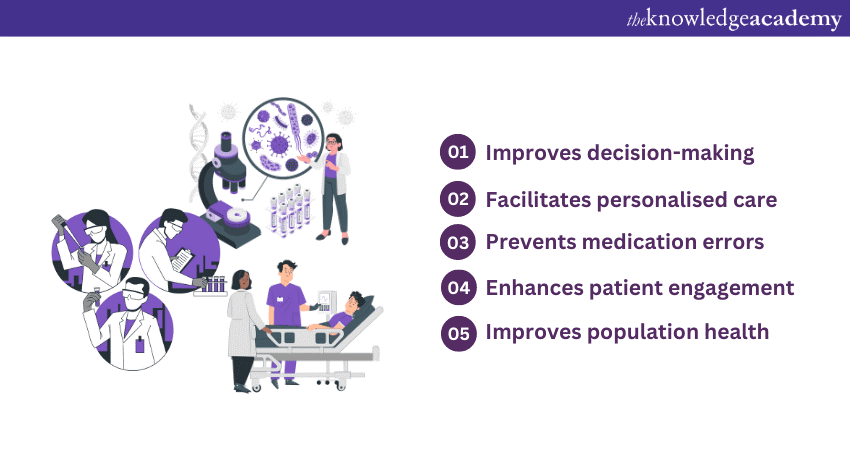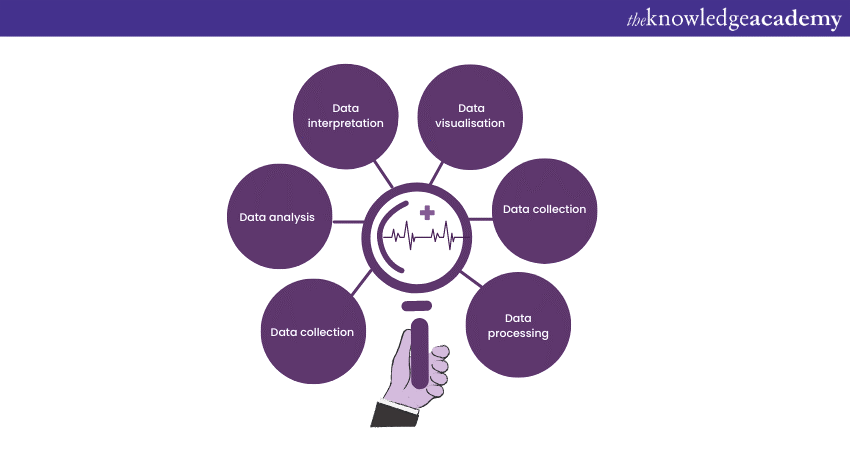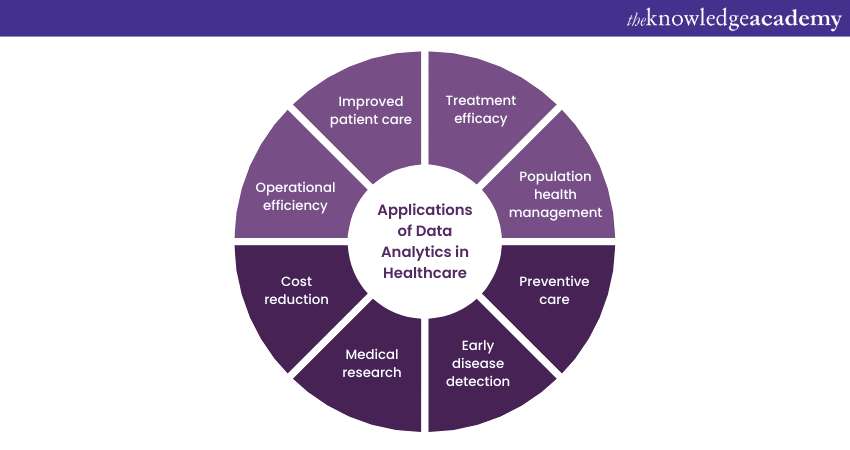We may not have the course you’re looking for. If you enquire or give us a call on 01344203999 and speak to our training experts, we may still be able to help with your training requirements.
Training Outcomes Within Your Budget!
We ensure quality, budget-alignment, and timely delivery by our expert instructors.

After the pandemic, the importance of maintaining proper health has been prioritised by people across the globe. This has inadvertently made the Healthcare domain become one of the most data-intensive industries. With the increasing availability of data, Healthcare providers are turning to Data Analytics to derive insights and thus improve the quality of healthcare services.
According to Infosys BPM, Data Analytics “reduces the cost of treatment and predicts epidemics and life-threatening diseases on time”. With such immense benefits, the global Healthcare analytics market is set to increase from £18.32 billion in 2020 to £75.51 billion by 2030 at a CAGR of 15.3%.” Data Analytics in Healthcare analyses vast amounts of data collected from various sources. This leads to more informed decision-making, enhances efficiency, improves patient outcomes, and reduces costs.
In this blog, we discuss how Healthcare Data Analytics uses advanced methods to derive insights to improve patient care, efficiency, and decision-making in the industry.
Table of Contents
1) A Brief Overview of Healthcare Data Analysis
2) Importance of Data Analytics in Healthcare
3) How Does Healthcare Data Analytics Work?
4) Ways to Use Data Analytics in Healthcare
5) Conclusion
A brief overview of Healthcare Data Analysis
So, what do you understand by Healthcare Data Analytics? Healthcare Data Analytics is a multifaceted process that leverages statistics, algorithms, and Machine Learning (ML) techniques to examine large volumes of health-related data. It is primarily used to identify trends, improve patient outcomes, optimise costs, and make informed clinical decisions.
Healthcare Data Analytics involves various stages, from data collection—obtaining raw data from multiple sources. Such as electronic health records, genomic databases, and wearable technology—to data processing, which includes cleaning, integrating, and preparing the data. This is followed by the core phase of data analysis, where advanced analytical methods are used to extract meaningful insights.
If you are wondering why this analysis is communicated, you should know that these insights are visualised and communicated in a user-friendly format for effective decision-making. These insights also reduce the cost incurred in Healthcare and improve treatments for patients.
Gain more insight regarding Data Analytics with our course on Big Data and Analytics Training
Importance of Data Analytics in Healthcare
Healthcare Data Analytics is rapidly becoming an essential element in a multitude of ways. Its primary aim is to leverage extensive health-related data in order to make informed decisions that improve patient outcomes, boost operational efficiency, and reduce Healthcare costs. These are some ways you can know that Data Analytics is improving Healthcare:

1) Improves decision-making: Data Analytics provides Healthcare professionals with actionable insights that can guide decision-making, improving both patient outcomes and operational efficiency.
2) Facilitates personalised care: Data Analytics allows for personalised medicine by analysing patient's individual data to tailor treatments and interventions.
3) Prevents medication errors: By analysing patient records and prescriptions, Data Analytics can help prevent medication errors which can be potentially life-threatening.
4) Enhances patient engagement: Through the analysis of patient feedback and engagement, Healthcare providers can improve their services and communication, leading to better patient experiences.
5) Improves population health: By analysing large sets of data, Healthcare providers can track and predict public health issues, aiding in preventative measures and policy development.
6) Strengthens health information exchange: Data Analytics aids in the effective and secure exchange of health information, improving coordination of care and patient outcomes.
7) Enables predictive analysis: Data Analytics enables predictive modelling, which can forecast patient outcomes, potential outbreaks, and Healthcare trends.
8) Boosts medical research: Data Analytics accelerates medical research by providing insights into patterns and associations, contributing to the development of new treatments and therapies.
9) Streamlines administrative processes: Data Analytics can help identify inefficiencies in administrative processes and suggest areas for improvement, saving time and resources.
10) Identifies training needs: By analysing performance data, Healthcare providers can identify areas where further training or development is needed.
11) Monitors patient adherence: Data Analytics can track patient adherence to medication regimes and lifestyle changes, aiding in improved patient management.
12) Improves quality of care: Through the analysis of patient outcomes and satisfaction data, Healthcare providers can notify the areas for improvement and develop strategies to enhance the quality of care.
13) Supports risk management: By identifying potential risks and vulnerabilities, Data Analytics supports risk management in the Healthcare settings.
14) Aids in resource allocation: Data Analytics can help predict future demand for services and assist in the effective allocation of resources.
Gain an in-depth understanding of Big Data with our comprehensive guide on Big Data Analysis Training.
How does Healthcare Data Analytics work?
Healthcare Data Analytics plays a pivotal role in enhancing patient care, managing costs, predicting outbreaks, and driving strategic decision-making. So, if you want to understand the stages that lead to an efficient model of Healthcare using Data Analytics, these will help you out:

a) Data collection: Data collection in healthcare can be complex due to the variety of sources which includes electronic health records, medical devices, wearable technology, and patient surveys, to name a few. The first step involves gathering this diverse set of data in a systematic way.
b) Data processing: Once the data is collected, it's time to process it. This involves structuring the data into a useful and manageable format, which can then be stored in databases or data warehouses. With the progressing use of electronic health records, data processing has become more streamlined in the Healthcare sector.
c) Data cleaning: Data quality is critical in the Healthcare industry as the stakes are high. Errors, duplicates, or inconsistent data can lead to wrong diagnoses or treatments. Hence, data cleaning is an essential step, which involves checking for errors, fixing them, and ensuring the overall quality and reliability of the data.
d) Data analysis: In this stage, statistical tools and algorithms are used to uncover patterns, trends, and insights from the collected data. This could mean identifying risk factors for a disease, predicting patient outcomes, or understanding the effectiveness of a treatment.
e) Data interpretation: Interpreting the results accurately is crucial in Healthcare Data Analytics. Clinicians, data scientists, and Healthcare administrators work together to make sense of the analysed data and derive meaningful, actionable insights.
f) Data visualisation: Visualising data helps in better understanding of the insights and facilitates communication among Healthcare professionals. This could be in the form of graphs, charts, dashboards, or even sophisticated interactive visualisations.
Now you know what goes on to create tailored, and personalised results behind each patient, to make the Healthcare industry more accessible and cost effective.
Attain specialisation in Data Analytics with our Advanced Data Analytics Certification.
Ways to use Data Analytics in Healthcare
Since we have established the pros of using Healthcare Data Analytics, we’ll show you how it can be used to improve the Healthcare system. Here's how:

a) Improved patient care: By analysing patient data, Healthcare providers can create personalised treatment plans that cater to the unique needs of each patient. Predictive analytics can also identify high-risk patients and provide preventative measures to reduce readmissions.
b) Operational efficiency: Data Analytics can help Healthcare facilities become more efficient by providing insights into operations, helping identify bottlenecks, and suggesting areas for improvement.
c) Cost reduction: By identifying inefficiencies and predicting future trends, Data Analytics can help hospitals and clinics cut down on unnecessary costs.
d) Medical research: Data Analytics plays a pivotal role in clinical trials and research. It helps in understanding patterns, verifying hypotheses, and interpreting complex biological data.
e) Early disease detection: Predictive analytics can examine patient data to identify early signs of diseases, even before the patient experiences any symptoms.
f) Preventive care: By analysing lifestyle data along with medical records, Data Analytics can recommend preventive measures to keep diseases at bay.
g) Population health management: Data Analytics can help in understanding health trends at a population level, aiding in effective disease management and policy-making.
h) Treatment efficacy: By comparing patient data before and after a treatment, Data Analytics can help in determining the effectiveness of different treatment options.
i) Reduced fraud: Analytics can be used to detect anomalies or irregularities in billing, reducing instances of fraud and overbilling.
j) Drug development: In pharmaceutical research, Data Analytics can accelerate drug development by making sense of complex experimental data.
k) Telemedicine: With the rise of telemedicine, Healthcare Data Analytics can help in providing remote patient monitoring and effective virtual care.
l) Resource allocation: Data Analytics can guide decision-makers in effective allocation of resources by predicting future demand.
m) Patient satisfaction: By analysing patient feedback and correlating it with other factors, Data Analytics can help improve patient satisfaction levels.
n) Health risk alert: Data Analytics can send alerts about potential health risks based on the analysis of real-time data.
o) Genomics and personalised medicine: By analysing genetic data, Healthcare providers can offer more personalised treatments, marking a significant stride towards personalised medicine.
Conclusion
Data Analytics has undeniably become an integral part of the Healthcare industry, revolutionising the way we understand and respond to health challenges. By transforming vast quantities of data into meaningful insights, it empowers Healthcare professionals to make more informed decisions. This includes prediction of health trends, providance of personalised care, and improvement of overall operational efficiency. In essence, the importance of Healthcare Data Analytics cannot be overstated. It is the foundation for a more patient-centred, efficient, and proactive Healthcare system, driving us towards a healthier future.
Complete your understanding of Data Visualisation with our comprehensive guide on Data Science Analytics.
Frequently Asked Questions
Upcoming Data, Analytics & AI Resources Batches & Dates
Date
 Hadoop Big Data Certification
Hadoop Big Data Certification
Thu 12th Sep 2024
Thu 12th Dec 2024







 Top Rated Course
Top Rated Course



 If you wish to make any changes to your course, please
If you wish to make any changes to your course, please


